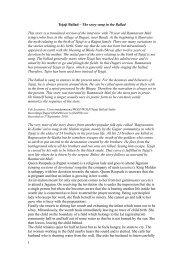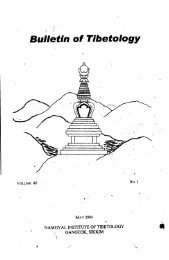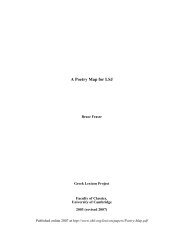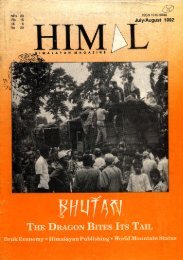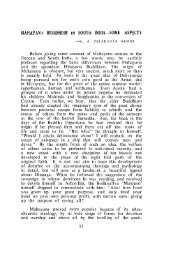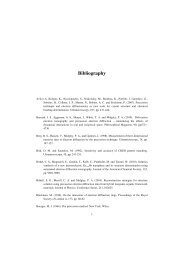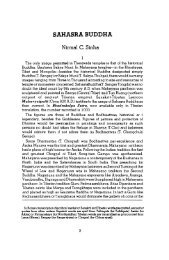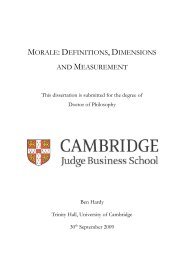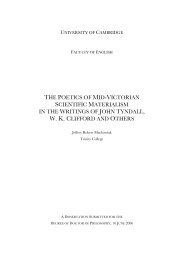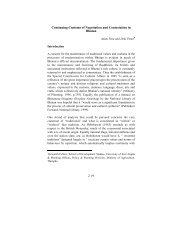The Crusades, the Genoese and the Latin East - DSpace at ...
The Crusades, the Genoese and the Latin East - DSpace at ...
The Crusades, the Genoese and the Latin East - DSpace at ...
You also want an ePaper? Increase the reach of your titles
YUMPU automatically turns print PDFs into web optimized ePapers that Google loves.
Nos sumus Christiana et specialiter lanuenses merc<strong>at</strong>ores, qua postquam audiuimus de<br />
uictoria quam Saladinus fecit, securiter cum fidutia in terram suam uenimus; unde<br />
postulamus et habere uolumus sagittam unam ab ipso, causafidutie. '84<br />
This excuse apparently convinced Saladin, <strong>and</strong> surely pleased Conrad's audience who<br />
praised his wit. Reading between <strong>the</strong> lines, however, this story shows th<strong>at</strong> Saladin allegedly<br />
agreed to let <strong>Genoese</strong> merchants carry on trading in <strong>the</strong> conquered l<strong>and</strong>. Fur<strong>the</strong>rmore, it reveals<br />
th<strong>at</strong> <strong>the</strong> people of Genoa found <strong>the</strong> story plausible. If it made sense to <strong>the</strong> readers th<strong>at</strong> Genoa's<br />
merchant vessels were able to cross <strong>the</strong> lines <strong>and</strong> trade on both sides <strong>the</strong>re is no reason to believe<br />
this was not indeed <strong>the</strong> case. Fur<strong>the</strong>rmore, in Chapter Three <strong>the</strong> issue of Christians in Muslim<br />
captivity will be discussed. It will be argued th<strong>at</strong> Italian merchants had played an important role<br />
in ransoming those captives as well as paving <strong>the</strong> ground for diplom<strong>at</strong>ic negoti<strong>at</strong>ions between <strong>the</strong><br />
enemies.<br />
To summarise this issue, it seems th<strong>at</strong> <strong>the</strong> evidence from 1190,1191 <strong>and</strong> 1203 suggests<br />
th<strong>at</strong> keeping away from war zones was a general policy of merchants. A combin<strong>at</strong>ion of a lack of<br />
contracts on commonly followed trade routes, with explicit prohibitions, signified a war zone, a<br />
danger to merchants <strong>and</strong> a market to be avoided unless things would have changed by <strong>the</strong> time of<br />
<strong>the</strong> merchants' actual arrival in <strong>the</strong> east. <strong>The</strong> <strong>Genoese</strong><br />
trusted <strong>the</strong>ir experienced merchants to act<br />
in <strong>the</strong> best possible way for <strong>the</strong> profit of all sides. <strong>The</strong>y <strong>the</strong>refore rarely sent a merchant directly<br />
to such destin<strong>at</strong>ion were <strong>the</strong> commodities would be <strong>at</strong> risk. '85<br />
In <strong>the</strong> light of this conclusion, it is striking to find th<strong>at</strong> Alex<strong>and</strong>ria maintained its<br />
popularity as a commercial destin<strong>at</strong>ion as l<strong>at</strong>e as <strong>the</strong> autumn of 1203. In his descriptions of <strong>the</strong><br />
events of th<strong>at</strong> summer, Villehardouin claimed time <strong>and</strong> again th<strong>at</strong> <strong>the</strong> crusaders were assured of<br />
embarking to Egypt <strong>at</strong> <strong>the</strong> l<strong>at</strong>est <strong>at</strong> Michaelmas of th<strong>at</strong> year. But in <strong>the</strong> cartularies, Genoa's<br />
merchants showed no signs of concern about <strong>the</strong> war approaching Alex<strong>and</strong>ria. <strong>The</strong>refore, we<br />
must assume th<strong>at</strong> <strong>the</strong> <strong>Genoese</strong> ei<strong>the</strong>r did not know or did not believe th<strong>at</strong> <strong>the</strong> troops of <strong>the</strong> Fourth<br />
Crusade intended to reach Egypt in 1203. It is highly unlikely th<strong>at</strong> Genoa did not know in<br />
September 1203 wh<strong>at</strong> <strong>the</strong> crusaders' plans were. Alexios IV, according to Villehardouin,<br />
promised publicly as early as January 1203 to join <strong>the</strong> crusade on its way to Egypt (Babilloine)<br />
with 10,000 ' 86<br />
men. On <strong>the</strong> eve of Alexios' coron<strong>at</strong>ion in Constantinople <strong>the</strong>se terms were<br />
184<br />
Regni iherosolymitani brevis historia, in Ann. Ian.. vol. 1, p. 145. `We are Christians, <strong>and</strong> particularly<br />
<strong>Genoese</strong> merchants, who as soon as we have heard of <strong>the</strong> victory Saladin accomplished, we came to his<br />
l<strong>and</strong> safely with trust (securiter cum fidutia); we pray <strong>and</strong> ask to have from himself (Saladin) an arrow, as a<br />
token of trust (causafrdutie)'<br />
185 Only one such case can be found in <strong>the</strong> years of <strong>the</strong> Third Crusade, when a merchant was sent to ransom<br />
a <strong>Genoese</strong> captive <strong>at</strong> <strong>the</strong> beginning of 1192. This case will be discussed in <strong>the</strong> following chapter.<br />
186 Villehardouin, vol. 1, p. 92, sec. 93.<br />
63



